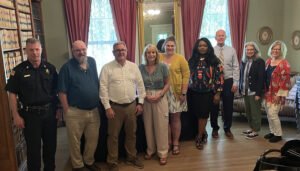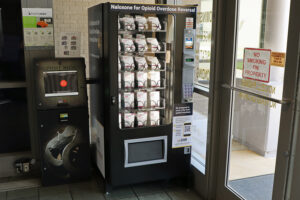
The New York Overdose Response Strategy (ORS) team developed and piloted a Mock Overdose Fatality Review (OFR) Toolkit—a first-of-its-kind resource designed to help communities prepare for real OFRs through a hands-on, multidisciplinary tabletop exercise (TTX). This practice-based toolkit gives jurisdictions a safe, supportive environment to build capacity, strengthen cross-sector relationships and walk through the OFR process from start to finish.
Since 2024, the NY ORS team has piloted the toolkit in three counties—Oswego, Putnam and Essex—using participant feedback to refine and enhance the resource. Grounded in national OFR standards and emergency preparedness principles, the toolkit guides participants through a fictional but realistic overdose fatality case review, drawing on real-world trends and challenges to foster meaningful engagement. It is particularly suited for jurisdictions in the early stages of OFR planning, offering a structured yet low-pressure setting to practice case discussions, identify system gaps and develop actionable recommendations.
The Mock OFR Toolkit comes complete with a fictional case profile, communication templates, discipline-specific incident reports, role-based narratives and a detailed handbook covering every step—from assembling the planning team to conducting a post-exercise debrief. These ready-to-use materials not only help demystify the OFR process but also reduce anxieties about launching complex reviews by providing clear guidance and planning support.
Feedback from pilot counties has been overwhelmingly positive. Participants reported a stronger understanding of the OFR model, improved collaboration and greater confidence in leading real OFRs. Essex County OFR Planning Team shared, “The Mock OFR Toolkit has been invaluable, providing a structured guide that made the tabletop exercise real, impactful, and actionable. Thanks to ORS leadership, we are moving forward confidently toward our first official OFR.” Putnam County Suicide and OFR (SOFR) Planning Team echoed this sentiment, noting, “The OFR TTX empowered us to formalize this new process, and our partners are eager to participate in our first official fatality review.” Moreover, Oswego County Public Health and Safety Team (PHAST) reported, “We worked with NYS ORS to conduct a Mock OFR for our OFR partners to experience how the process works before starting actual reviews. The ORS team provided the scenario with case materials, with modeling based on local data. Conducting the exercise helped to demonstrate to our partners the value of the review process.” This innovative toolkit is an important stepping stone for New York communities—helping them prepare effectively to review overdose deaths, strengthen prevention strategies and ultimately save lives.
For more news on the New York ORS team’s OFR efforts, read Supporting Rural Communities: New York ORS Team Assists in Developing an Overdose Fatality Review.

Youth substance use continues to be a key focus of public health efforts in Colorado, and prevention professionals across the state are working to create

“The “Be in the Know” campaign—developed by the Pima County Health Department, law enforcement partners, the Arizona Overdose Response Strategy (ORS) team and university partners—was

Recognizing the importance of collaboration between public health and public safety, the four Overdose Response Strategy (ORS) teams in the Rocky Mountain High Intensity Drug

In July 2025, swift coordination between law enforcement and public health partners enabled Baltimore City to respond rapidly to a suspected mass casualty overdose event.

The New York Overdose Response Strategy (ORS) team developed and piloted a Mock Overdose Fatality Review (OFR) Toolkit—a first-of-its-kind resource designed to help communities prepare

In a first for Georgia, the state’s Overdose Response Strategy (ORS) team helped launch a new initiative with the installation of a naloxone vending machine